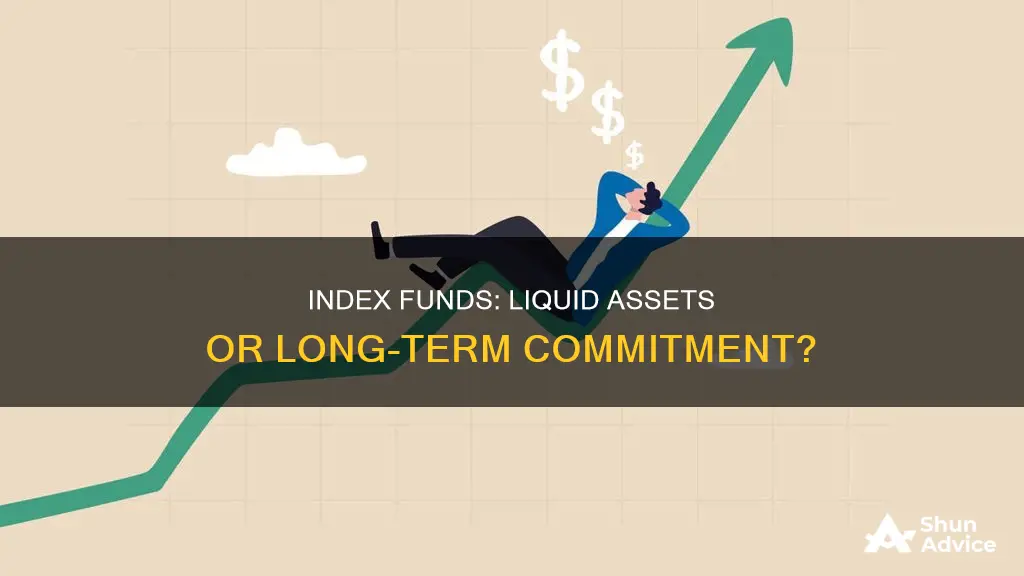
Index funds are a type of mutual fund or exchange-traded fund (ETF) that tracks the performance of a market index, such as the S&P 500, by holding the same stocks or bonds or a representative sample of them. Index funds are passively managed, meaning the fund manager does little day-to-day adjustment of the fund's allocations. One of the main benefits of investing in index funds is that they offer a low-cost way for investors to track popular stock and bond market indexes. However, not all index funds are cheap, and investors need to consider the specific index fund they select. In this article, we will explore the topic of investing in index funds and discuss the liquidity of these investments.
| Characteristics | Values |
|---|---|
| Type of fund | Mutual fund or exchange-traded fund (ETF) |
| Investment strategy | Passive |
| Management | Passive (but not always) |
| Investment type | Stocks or bonds |
| Investment aim | To track a market index, such as the S&P 500 |
| Returns | Very close to those of the index |
| Risk | Not immune from risk or losses |
| Taxes | More tax-friendly than similar active funds |
| Fees | Lower fees than actively managed funds |
| Liquidity | High |
| Flexibility | Low |
| Performance | Outperform actively managed funds |
What You'll Learn

Index funds are passively managed
Passive management is associated with mutual and exchange-traded funds (ETFs). An index fund's portfolio is designed to reflect the performance of a particular index, so its returns should be very close to those of the index. Passive funds tend to charge lower fees to investors than funds that are actively managed.
Passively managed funds are based on the Efficient Market Hypothesis (EMH). This hypothesis states that markets at any given time incorporate and reflect all information, rendering individual stock-picking futile. As a result, the best investment strategy is to invest in index funds, which have historically outperformed most actively managed funds.
The three largest index funds are the Vanguard 500 Index Fund Admiral Shares, the Vanguard Total International Stock Index Fund, and the Vanguard Total Stock Market Index Fund Admiral Shares.
Debt Fund Investment: Strategies for Success
You may want to see also

They aim to replicate the performance of a market index
Index funds are a type of mutual or exchange-traded fund (ETF) that tracks the performance of a market index, such as the S&P 500, by holding the same stocks or bonds or a representative sample of them. They are defined as investments that mirror the performance of benchmarks like the S&P 500 by mimicking their makeup.
Index funds are designed to reflect the performance of a particular index, so their returns should be very close to those of the index. They are usually passively managed, meaning the fund manager does little day-to-day adjustment of the fund's allocations. This passive management style often makes them cheaper than similar actively managed funds, as they are able to charge lower fees to investors.
There are two main strategies for index replication: physical index replication and synthetic index replication. Physical index replication involves holding the real stocks, while synthetic index replication involves holding derivatives such as swaps, which are contracts for the returns of the index.
Physical index replication makes sense because it is natural; this is what people would do if they wanted to replicate the performance of an index. The bigger the fund, the more shares they will have of each company, replicating each company's weight in the index. If a fund owns shares of all the companies in an index, it is called full replication. However, this may not always be easy or convenient, especially for small index funds. Therefore, some funds use a sampling strategy, where they only own shares of some of the companies in the index.
Synthetic index replication can be more precise, even for small funds, and can have very low costs since there are no transaction costs. However, there is more risk associated with this strategy due to counterparty risk.
Overall, index funds are a popular choice for investors seeking low-cost, diversified, and passive investments that can outperform many higher-fee, actively traded funds.
Rebalancing Your American Funds Portfolio: A Step-by-Step Guide
You may want to see also

They are a low-cost investment option
Index funds are a low-cost investment option. They are passively managed, meaning the fund manager does little day-to-day adjustment of the fund's allocations. This passive management style means that index funds are able to charge lower fees to investors.
Index funds are a type of mutual or exchange-traded fund (ETF) that tracks the performance of a market index, such as the S&P 500, by holding the same stocks or bonds, or a representative sample of them. This means that index funds have lower expenses and fees than actively managed funds. Actively managed funds have large staffs and conduct trades with more complications and volume, driving up costs.
Index funds are often more tax-friendly than similar active funds. They are also more transparent, as the holdings of an index fund are well-known and available on almost any investing platform.
The primary difference between ETFs and index funds is how they're bought and sold. ETFs trade on an exchange just like stocks, and you buy or sell them through a broker. Index funds are bought directly from the fund manager. Because ETFs are bought and sold on an exchange, you will pay a commission to your broker each time you make a trade. However, some brokers offer commission-free trading.
ETFs generally have a slight advantage when it comes to annual expense ratios. But the difference between expense ratios for widely traded ETFs and index funds has narrowed in recent years and almost disappeared.
Bond of America: State Investment Destinations
You may want to see also

Index funds are not immune to market downturns
Index funds are a type of mutual or exchange-traded fund (ETF) that tracks the performance of a market index, such as the S&P 500. They are designed to reflect the performance of a particular index, so their returns are very close to those of the index. While index funds are considered a relatively safe investment compared to individual stocks, they are not immune to market downturns.
Index funds are passively managed, meaning the fund manager does little day-to-day adjustment of the fund's allocations. This passive management style means that index funds will decline in value when the market does and cannot pivot away when the market shifts. This inherent lack of flexibility is one of the main critiques of index funds.
During a major sell-off, when the index itself loses value, an index fund holding the underlying securities of the index will also lose value. However, investors who hold on to their fund investments should see the fund value increase as the value of the index itself reverses course and increases.
Index funds are highly diversified, buying and holding identical weights of each stock in an index. This diversification means that it is almost impossible for every stock's market price to fall to zero at the same time. However, in a worst-case scenario, where every company in an index goes bankrupt, investors would likely recover some money based on the book value of the firm as it sells off its assets in liquidation.
While index funds are considered a safe investment, they are not immune to market downturns and can lose value along with the broader market. However, due to their diversification and low expense ratios, they are still considered a good choice for investors looking for a passive, low-risk investment strategy.
Best Funds to Invest in: How to Choose
You may want to see also

They are a tool, not a guarantee of investment success
Index funds are a type of mutual or exchange-traded fund (ETF) that tracks the performance of a market index, such as the S&P 500, by holding the same stocks or bonds or a representative sample of them. They are defined as investments that mirror the performance of benchmarks by mimicking their makeup. Index funds are passively managed, meaning the fund manager does little day-to-day adjusting of the fund's allocations. This passive management style offers several benefits, including lower fees, broad-based diversification, and lower taxes.
However, it is important to remember that index funds are not a guarantee of investment success. Just investing in an index fund or two doesn't mean that you're on your way towards achieving your investment or financial planning goals. Index funds are tools, and to gain the most benefit from using them, you need to have a strategy. They work well as part of an asset allocation plan, offering purity within their investment styles. Financial advisors often put together portfolios of index funds that are allocated in line with their client's risk tolerance and financial plan.
Another thing to keep in mind is that not all index funds are created equal. While they aim to track a market index, the way they do this can vary, and some may be better at tracking an index than others. Additionally, owning an index does not mean you are immune from risk or losses if the markets take a downturn. Investors in an index fund tracking the S&P 500 during a bear market will experience losses just like the index. Therefore, it is crucial to do your research and understand what you are investing in before choosing an index fund.
When choosing an index fund, it is essential to consider factors such as fees, minimum investments, taxes, and liquidity. ETFs, for example, are bought and sold on an exchange like stocks, and you will pay a commission to your broker each time you trade. Index funds, on the other hand, are bought directly from the fund manager and may have lower minimum investment requirements. It is also important to look at the fund's expense ratio, which is the percentage of assets you'll pay for managing the fund.
In conclusion, index funds can be a valuable tool for investors seeking passive index strategies and broad diversification at a low cost. However, they are not a guarantee of investment success, and it is essential to have a well-thought-out strategy and do your research before investing.
Invest Like Mohnish Pabrai: Fund Strategies and Secrets
You may want to see also
Frequently asked questions
An index fund is a mutual fund that tracks a market index, such as the S&P 500. Index funds are passively managed and designed to reflect the performance of a particular index, so their returns are very close to those of the index.
Index funds offer a range of benefits, including lower fees, broad-based diversification, and lower taxes. They are also a good option for investors who want a hands-off investment strategy that still offers a range of investment diversity.
Investing in an index fund does not reduce the risk of loss. If the market takes a downturn, index fund investors will experience losses just like the index. Additionally, index funds may not offer the same potential for high returns as actively managed funds.
The liquidity of an index fund depends on whether it is structured as a mutual fund or an exchange-traded fund (ETF). Mutual funds are bought directly from the fund manager and transactions are cleared in bulk after the market closes, whereas ETFs are traded on an exchange like stocks and can be bought and sold at any time during market hours.







